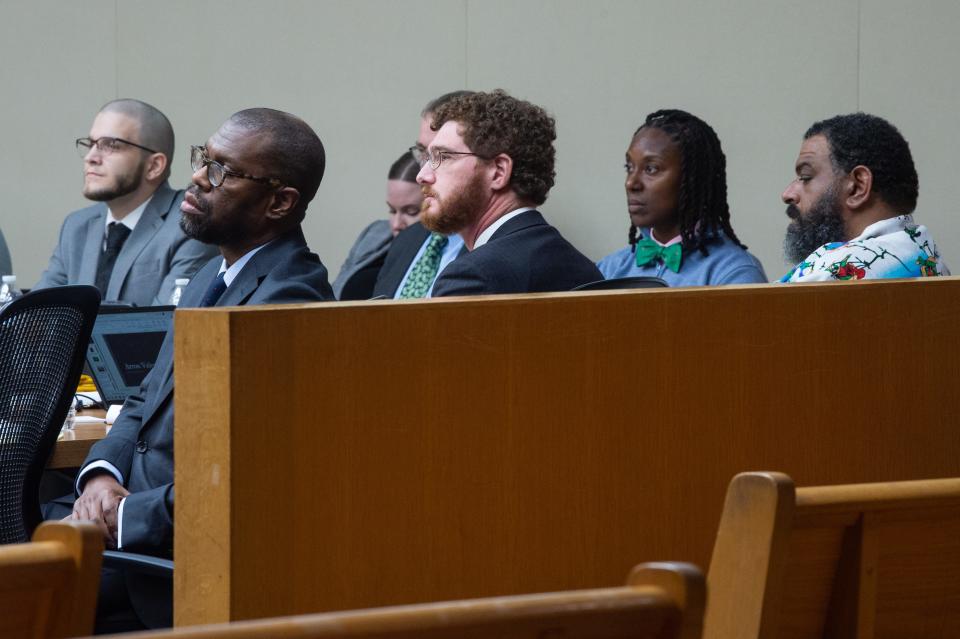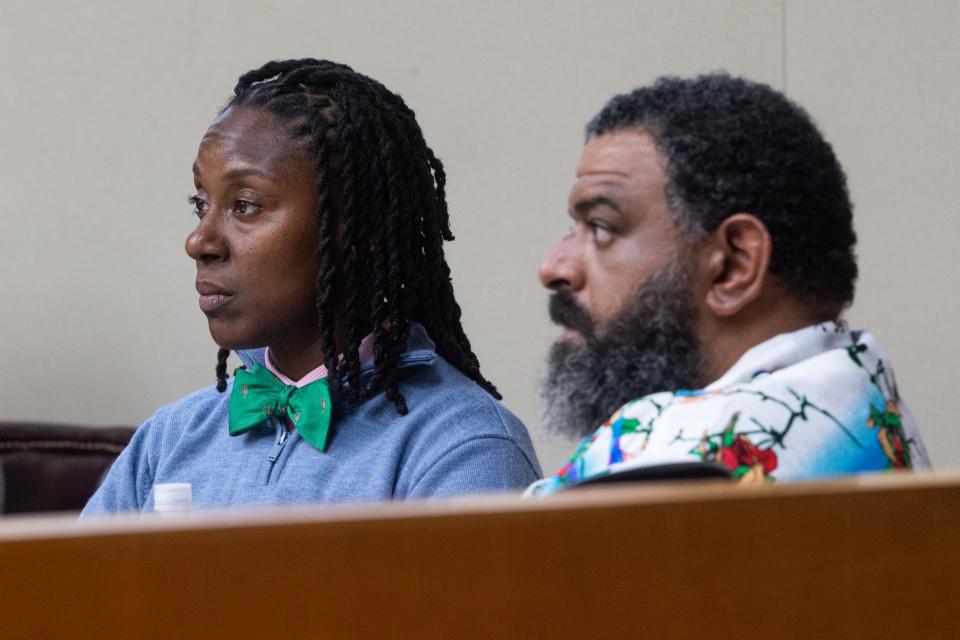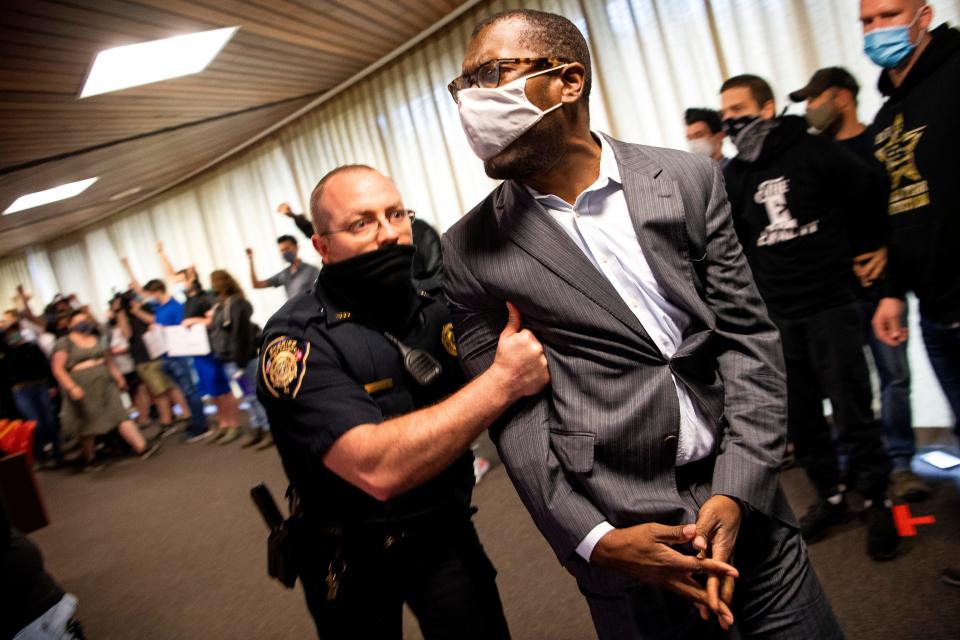Knoxville activists go to trial over Tennessee law to criminalize peaceful protest
- Oops!Something went wrong.Please try again later.
Nearly three years after a group of Knoxville activists were arrested during their demonstration for police accountability, a Knox County jury will decide whether to embrace or reject Tennessee's recent attempts to criminalize peaceful protest.
Four demonstrators, including activists Constance Every and Calvin Skinner, are on trial on charges they disrupted a public meeting in 2021 following the police shooting death of 17-year-old Anthony Thompson Jr.
Thompson was killed on April 12, 2021, by a Knoxville police officer inside an Austin-East Magnet High School bathroom, an inflection point in the city that sparked the largest, most sustained protests in a generation. Demonstrators marched repeatedly over weeks calling for police reform and challenging racial inequality.

Seven of the demonstrators were charged after they stood during a Knox County Commission meeting on April 19, 2021, and called for the release of police body camera video of the shooting. The demonstration briefly interrupted the commission meeting, though police and deputies moved immediately to stop the protest by handcuffing and pulling the activists from the room.
Three of those charged - Kevin Andrews, Carrie Hopper and Mary Winter - have agreed to plea deals. Every, Skinner, Gavin Guinn and Aaron Valentine are putting justice in the hands of a jury.
Here's a summary of key points to catch you up from the first full day of testimony on April 9, including why Knox County Commissioner Larsen Jay took the stand.
Defendants' attorneys have different strategies
None of the four defendants have argued they weren’t protesting at the meeting. There’s plenty of video to prove they were. However, attorneys for two of the four, Guinn and Valentine, argued their clients did not disturb the commission meeting.
It was Every who activated a bullhorn to address the commissioners. Skinner raised his voice while he was being led out of the meeting.
Prosecutors assert Guinn and Valentine surrounded Every and Skinner, preventing officers from reaching them and (more important) the bullhorn.
Knox County Sheriff's Office was tracking Constance Every on social media
The morning’s hearing was taken up the cross-examination of Knox County Sheriff Sgt. John Sharp, one of the officers who arrested the activists. Specifically, Sharp was one of the officers who arrested Skinner.
During testimony, Sharp said he alerted his supervisors that he found a Facebook post made by Every announcing a protest of a county commission meeting. He sent them a screenshot of the post.
Sharp testified he was aware of Every’s Facebook page - like others he monitors - because the sheriff's office had received a tip about Every unrelated to the protest (there has been no evidence presented that Every broke any laws and she has not been charged in connection with the tip).
The jury was not allowed to hear this portion of the testimony, though it took place in open court.

The defense was interested in Sharp’s testimony, trying to zero in on whether the sheriff’s office planned ahead of time to target demonstrators demanding police accountability.
Why was Larsen Jay called to testify?
Jay, who is in his second term as an at-large county commissioner, was chair of the county commission at the time.
The county commission was the first public body to meet following the police shooting of Thompson, and a group of 40 or so demonstrators made their way into the meeting and stood at the back of the room with their fists raised.
A bullhorn siren sounded, and Every called out, “Knox County County Commission, your meeting is over,” while Skinner and other members of the group began shouting.
They were quickly and forcibly removed by deputies and police officers, and Jay recessed the meeting for 10 minutes.
During the first day of the trial April 9, defense attorneys asked Jay why the police accountability activists were treated differently than other demonstrators, particularly the anti-mask protesters who swarmed and sometimes interrupted meetings in 2020.
“They got up and walked out of the door,” Jay said about the anti-mask protesters. “In this incident when the officers came to escort them out they didn’t willfully walk out the door … this group intentionally came with the purpose of getting arrested.”
Knoxville Mayor Indya Kincannon also is on the witness list, though she won't testify, defense attorney Andrew Beamer told Knox News.
The defense was interested in hearing from Kincannon for two reasons. One, she made social media posts encouraging District Attorney Charme Allen to release the body camera footage of Thompson's death and two, she presided over a meeting of the Knoxville City Council that was disrupted by protesters.
That meeting took place nearly two weeks after the commission meeting. This time Thompson’s family joined protesters and there was no bullhorn. Unlike the commission meeting, Kincannon allowed protesters to speak from the back of the room for a few minutes before temporarily recessing the meeting. Every and Skinner were arrested and charged again with disrupting a public meeting.
Where the defense is headed
The prosecution has one more witness to call, but the next - and likely final - day of the trial will consist mostly of testimony from the defense's witnesses.
Beamer, the attorney for Every, told Knox News he'll focus on the nature of the state's charges, which he says are an attempt to silence protected political speech.
"My client was targeted by the police, both the (Knox County Sherriff's Office) and the (Knoxville Police Department)," Beamer said. "They were treated disparately and if they had been other protestors protesting something else, the outcome would have been absolutely different."
He explained the difference whether law enforcement arrested protesters at public meetings was based on the content of their speech. The demonstrators at public meetings calling for an end to COVID-19 mask mandates were not arrested.
Valentine's attorney, Joshua Hedrick, told Knox News his client's defense will focus on separating him from the rest of the defendants. Valentine, unlike Every and Skinner, was silent throughout the 10-minute interaction.
"He showed up at the meeting ... he's not doing anything. He's just making his presence known," Hedrick said. "There's a broad brush used to paint this group and what this group did. We're going to try to focus it on individual responsibility and individual liability."
The goal is to help the jury make a decision about Valentine's guilt based on his actions, not the group's, Hedrick said.
How we got here
The case is the first tried under Tennessee's enhanced penalties for disrupting public meetings. The law was part of the Tennessee General Assembly's push to punish "unruly" demonstrators who arose as part of a nationwide police reform movement that started when a Minneapolis police officer killed George Floyd in 2020.
The state enhanced the penalty for disrupting a public meeting from a Class B misdemeanor to a Class A misdemeanor, putting it on the same level as being charged with impaired driving, simple drug possession, theft under $1,000 and assault. The penalty can include up to 11 months and 29 days in jail with a maximum fine of $2,500.
The police shooting death of Thompson sparked sustained political demonstrations that included several protests at public meetings, including the April 19, 2021, county commission meeting.

Media barred from jury selection
A Knox News reporter and a photographer from WBIR were told by a bailiff no reporters would be allowed in the courtroom April 8 during jury selection by order of Judge Kelly Thomas, Jr. The decision is legal, though rare. Journalists typically are allowed in the courtroom for jury selection.
Thompson’s death sparked it
Thompson was killed April 12, 2021, after four officers barged into a school bathroom where he and a friend were hanging out as Thompson cooled off from an argument earlier in the day with his girlfriend.
His girlfriend had left school to go home, and her mother called police to complain about the argument, which she told police got physical. The girl’s mother, Regina Perkins, told officers Thompson was known to carry a handgun.
Thompson was carrying a handgun in the front pocket of his hoodie because he feared for his safety, especially after his girlfriend's mother sent him a series of threatening texts, according to a lawsuit filed by the family.
Body camera footage revealed four officers wound up inside the narrow bathroom: officers Jonathan Clabough and Brian Baldwin, school resource officer Adam Willson, and Lt. Stan Cash. They surrounded Thompson, who was in a stall and wearing a backpack, and began pulling him out of the stall.
Thompson implored the officers to "wait, wait" as they grabbed for him, and made no aggressive moves.
As the officers grabbed Thompson his gun discharged and a bullet struck a trash can. Baldwin immediately dropped from Clabough's view. Clabough mistakenly believed Baldwin had been shot, so he fired, striking Thompson in the chest with the shot that killed him.
Clabough fired a second shot because he thought Thompson was about to shoot Cash, the DA's office said. That shot struck Willson in the leg.
Lawsuit dismissed
In February, a federal judge dismissed the remaining pieces of the far-reaching lawsuit filed by Thompson’s mother against Knoxville. The judge had previously dismissed the portion of the lawsuit against the police officers involved in Thompson’s killing. The family has appealed the decision to the U.S. Sixth Circuit Court of Appeals, where it faces long odds of being overturned.
Tyler Whetstone is an investigative reporter focused on accountability journalism. Connect with Tyler by emailing him at tyler.whetstone@knoxnews.com. Follow him on X, formerly known as Twitter, @tyler_whetstone.
Support strong local journalism by subscribing at knoxnews.com/subscribe.
This article originally appeared on Knoxville News Sentinel: Knoxville activists on trial over Tennessee law to criminalize protest

